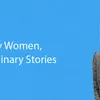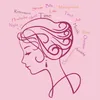Don't want depression to define me, become my identity: Shaheen Bhatt
With the launch of her book which speaks of her battle with depression, Shaheen Bhatt doesn't want it to be the only thing that defines her.
Author Shaheen Bhatt says her battle with depression is a part of her story, not her entire life, which is why she was apprehensive about writing a book "I've Never Been (Un)Happier" .
Shaheen was diagnosed with depression at eighteen, after five years of already living with it.
Her book is a tell-all which takes the readers through the author's personal pendulum of understanding and living with depression.
Shaheen says though her parents Mahesh Bhatt and Soni Razdan and sister Alia Bhatt were extremely supportive, she was apprehensive about opening up about her illness.
"That's generally the apprehension I've had. My only fear is I don't want this as my identity, that 'she is the girl who talks about depression.' This is one part of my life, a part of my story, not the whole story.
"Otherwise, I didn't have any other apprehensions. I come from a privileged position, have a fantastic support system so for me it was easy to talk about," she told PTI.
The author recalled having a bad day and wanting to post something on Instagram. The only glitch was, all the pictures she was looking to post were happy ones.
"I realised why am I putting up a happy picture when I'm not feeling happy. That's why I wrote about it. The positive response I got was so overwhelming, it resonated with so many people. That one post turned into an article, then another and eventually a book."
Shaheen took a year to write the book she has been writing, maintaining journals since she was 13 years old so the process came naturally to her. But she does not believe there's anything courageous about putting her battle with depression in public through the book.
"I think it's honest. I feel being honest and courageous are two different things. My parents are like that, they are very outspoken. For me, it wasn't ever about courage. I just felt good writing it, it was quite a liberating process."
The book, in association with Landmark and Penguin Random House, was launched on Wednesday.
Shaheen says certain parts in the book were hard for her family to read, but they were incredibly supportive.
Alia had recently opened up about how she felt guilty for not understanding her sister enough but Shaheen says she absolutely understands the helplessness of her family.
"There's only this much your loved ones can do for you with all their understanding. There's a limit. You are bound to feel that way (helpless) when you love someone. I know I would.
"I do feel that way. I have friends who live with depression, I also experience the same helplessness so I completely understand what it's like," she says.
Depression, however, is not only an illness which people fail to understand, it's also the one riddled with misconceptions.
"One of them is that depression happens to those who have time and luxury, which is absolutely not true. In India, it's like 'oh she has a mental illness, she's crazy, unstable.' People also think you have control over it. That's because it's a thing in the mind and you have control over your mind so therefore it's something you can also control," she adds.
Shaheen says the conversation about depression can be brought into mainstream through pop culture.
"The more you represent something on screen, the more it gets normalised. We are starting to do it. Alia featured in a film, which was about the therapy process and may be not mental illness, but it is a small way of bringing this into pop-culture and mainstream," she adds.









